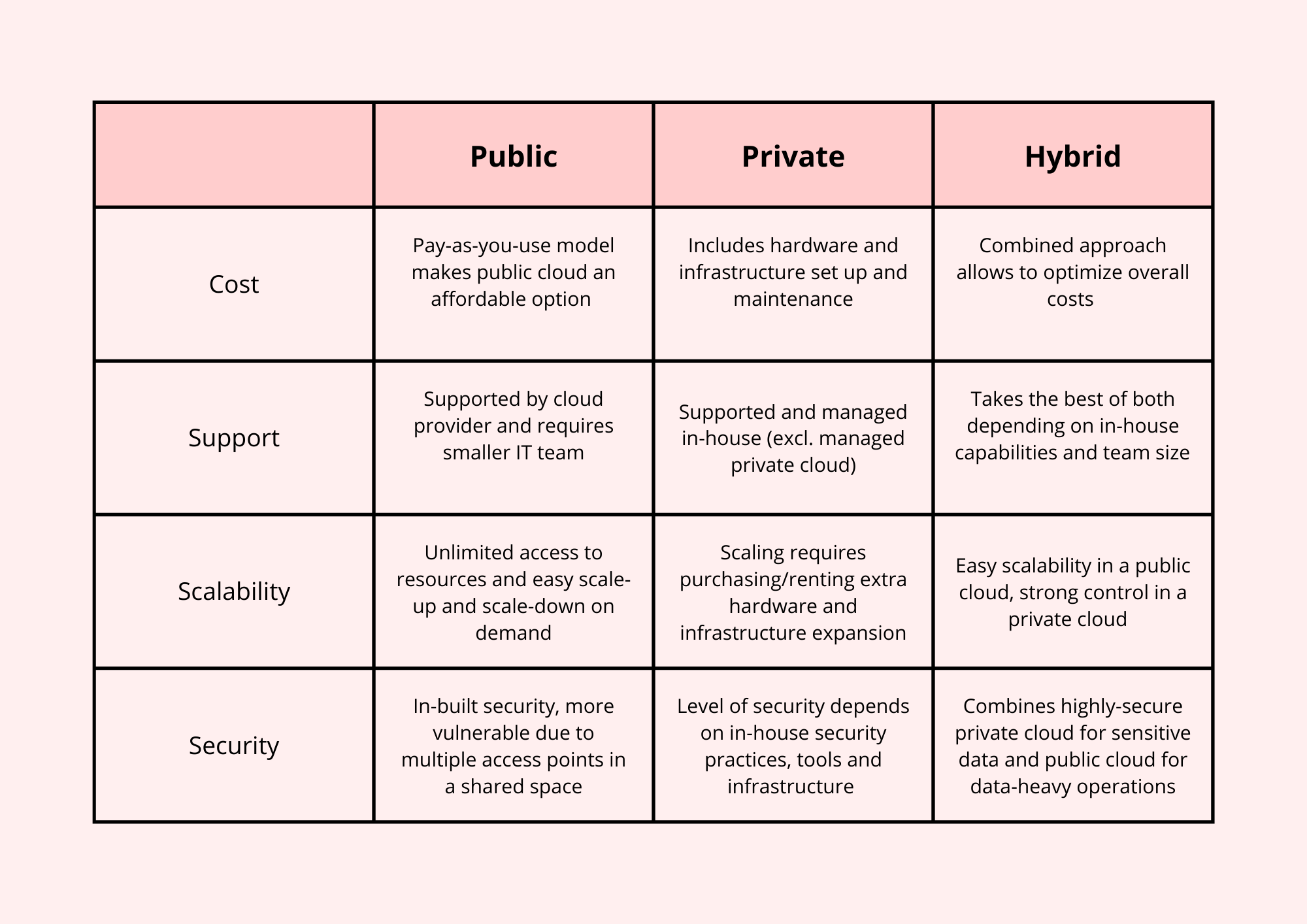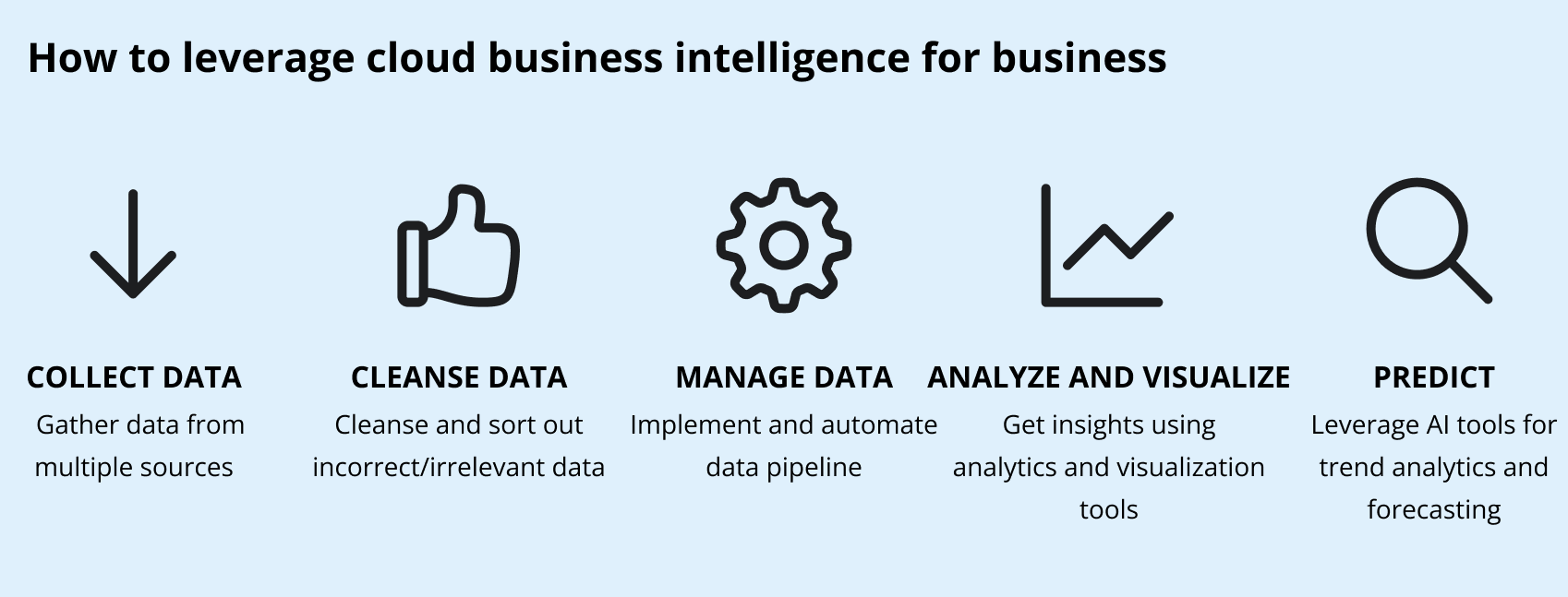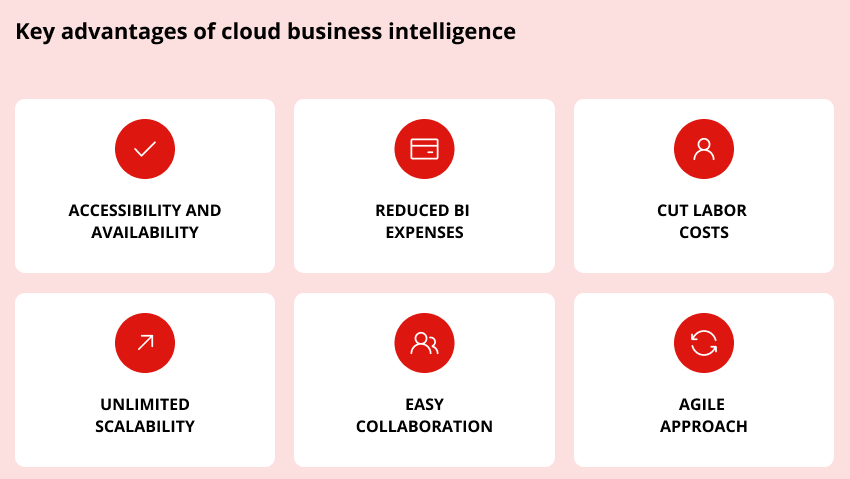Cloud Business Intelligence: Key Advantages for Business
Cloud business intelligence is by far the best approach to get fast and easy access to valuable business insights for your company. It works equally well for any organization whether you run a blue chip brand or a small business. And best of all, it won’t cost you zillions of dollars to integrate it into your process.
What’s the trick? Let’s find out.
In this 7-minute read, we talk about how to use cloud business intelligence to get the best of your data at a reasonable cost. We will answer the following questions:
- What is cloud BI and how can it fit into your IT infrastructure?
- Why use cloud business intelligence for web projects and insight-driven solutions and how will it affect your business outcomes?
- What key features to look for in a cloud BI solution?
But first, let’s start with a quick breakdown of the term itself and figure out how it can be deployed in your organization.
Cloud-based business intelligence is a modern approach to managing business data and generating insights using tools and infrastructure hosted in the cloud.
Cloud and BI make a powerhouse combo. Cloud solves the biggest challenges of BI such as scalability issues, high cost of deployment, and lack of accessibility throughout the organization.
The ideal business intelligence solution does not exi… Wait a second.
Imagine that all your mission-critical data activity, such as tracking performance or managing assets, is done in one place. It is hosted in the cloud, so you get immediate access to insights from anywhere in a web browser or mobile app. And your data infrastructure easily scales as your needs grow (more data, bigger boat).
What does it mean to be “hosted in the cloud”?
Generally speaking, it means that most or all BI functions such as data analytics and storage run in the cloud. Cloud servers can be located either in a remote data center (off-premises) or locally (on-premises). There are several types of cloud deployment you should know about if you consider adopting cloud business intelligence.

Major types of cloud deployment
Public cloud
This is one of the most popular and affordable options. Public cloud providers (AWS, Google Cloud, etc.) offer infrastructure, cloud services, and tools to multiple tenants.
- Cloud servers are located off-premises, though in some cases public cloud can also be deployed on your infrastructure.
- Services are provided on a pay-as-you-use basis making it not only an affordable but also a flexible option.
- It is easily scalable, which makes it one of the best options for cloud business intelligence in web development (e.g. if you work with a data-intensive web platform). You don’t have to bother with buying and placing new hardware, expanding your admin team, and supporting your infrastructure – your cloud provider does it for you.
Private cloud
Private cloud uses infrastructure dedicated to only one customer – you.
- It can be located on-premises (your servers) or remotely (rented resources in a data center).
- Private cloud is commonly advised as a more secure option. It has limited access points protected by the organization itself as opposed to shared infrastructure and multiple access points in a public cloud.
- To scale a private cloud, you need to buy or rent new hardware and bear all related expenses.
Hybrid cloud
Hybrid cloud approach allows you to leverage the advantages of both public and private clouds. To do that, you create several cloud environments depending on your requirements and goals. For instance, you use the private cloud to store highly sensitive data and rich public cloud resources to manage the ever-growing volume of data at a lower cost.
Multicloud
Multicloud refers to using more than one cloud from more than one provider (every hybrid is a multicloud, but not necessarily the other way around). You can choose this option for different reasons, for instance, if you need to distribute data assets or reduce costs.

Image credit: Power BI
There is a wide selection of out-of-the-box cloud BI tools like Power BI, Sisense, Tableau, Qlik, and Oracle BI. You can integrate any of them into your operations and adjust them to your needs. However, if you find that none of the existing solutions matches your needs, you can always build custom business intelligence software.
Get quality business insights faster and at a lower cost
Engage expert cloud architects and engineers to select the right cloud business intelligence approach and tools for your business.
Hire cloud expertsLet’s talk about the capabilities of this technology and show how you can use cloud BI to adopt a data-driven approach for decision-making.

Gather data
Use cloud BI software to gather heterogeneous data from different sources (CRM, ERP, cloud storage, Excel Sheets). Then put it together to see how different processes are connected and affect each other. It will help you discover new dependencies, relationships, and opportunities. Not to mention the time you will save having all your data in one space.
Cleanse and structure data
Poor quality of data is one of the biggest problems in BI. Inaccurate, incomplete data is good for nothing. In fact, it can bring even more damage than no data at all by providing inaccurate insights.
Them: Can you just quickly pull this data for me?
Me: Sure, let me just: SELECT * FROM some_ideal_clean_and_pristine.table_that_you_think_exists
Credit Seth Rosen @sethrosen
Integrate a cloud BI solution for web project development, process automation, asset management, or other BI goals to automate the data cleansing process and establish company-wise data quality practices.
Manage data
Data goes through a complex lifecycle before it can be transformed into actionable insights. Cloud BI tools perform the entire cycle of data transformation from extracting to safely storing it in a cloud repository. It makes data management effortless and cost-effective.
Visualize and analyze
Get in-built analytics, data visualization, interactive dashboards and reporting tools accessible on any device, from any place. Cloud BI provides you with a rich set of tools to analyze and drill data, share insights throughout the organization, and collaborate right there to speed up the decision-making process.
We will talk more about the analytics and visualization benefits of cloud BI for web-based projects in the next section, so stay tuned.
Make predictions
Thanks to the democratization of AI tools, you can now leverage machine intelligence even for small-scale operations. And adjust algorithms to your specific BI needs. You will see that nearly every modern off-the-shelf solution now uses ML models, NLP, predictive algorithms, or other tools to make forecasts, identify trends, and reveal hidden insights.
Companies have different ways to use BI in making decisions. Some use it more, some a little less. But if you work in a highly-competitive digital-first space, you most probably rely heavily on data in making important strategic steps.
In this section of the post, we talk about the major benefits of cloud BI for web project development and digital product growth. We will also show how a cloud-based approach helps tackle the biggest challenges of BI. Here are just some of them. Do you find them relatable?
- Too much data in various formats coming from too many resources
- No structured way to put it all together and see a big picture
- No clear understanding of what to track and how
- Long time to insight and lack of quick access
- Lack of resources to manage data
- High cost to support and scale data infrastructure
Solving even one of these problems is a big-time win. And cloud technologies help solve them all.

Improved accessibility and availability
Cloud finally made business insights available and accessible to everyone from key stakeholders in the organization to the end-users of a digital product. Modern cloud BI democratizes data. It enables a low learning curve thanks to self-service analytics, interactive dashboards, one-click reporting, and rich data visualizations.
Reduced expenses
Cloud will help you dramatically reduce BI costs, especially if you choose public cloud. First of all, it will cut your capital expenses. You won’t need to buy hardware or invest in setting up, running, and scaling your own data infrastructure. And second, when working with the cloud, you get good control over what you spend and tools to easily decrease or increase costs on demand. This is one of the main reasons why it is so popular to use cloud business intelligence software for web projects that scale fast.
Read: Portal vs. website: which one scales better?
Cut labor cost
Cloud providers offer a wide array of data services, in-built security, and managed cloud infrastructure. So you can run and support your BI activities with a smaller IT team.
Unlimited scalability
Seamless scalability and virtually unlimited resources are important advantages of cloud business intelligence for web projects. Cloud makes scalability easy by instantly expanding infrastructure and resources on demand. So when the volume of business data goes up, your BI dynamically responds to this change.
Easy collaboration
Another big advantage of cloud-based business intelligence is the many collaboration and sharing tools available online. For example, healthcare cloud computing makes it easier to share medical records among experts. BI tools can then analyze this data, helping doctors make better decisions and improve patient care.
Agility
Agility plays a special role among other benefits of cloud business intelligence for web project development. With cloud BI tools, you can monitor performance and market response in real time, discover trends, and foresee changes. It gives you competitive edge and helps stay ahead of the pack.
To reap these and many other benefits of cloud BI, choose (or build) a solution with the following essential features and tools.
Data management and security
Every cloud BI solution, custom or off-the-box, should be able to securely move data through every step of the pipeline from raw data to insight. It includes extracting, cleansing, sorting, and loading.
Role-based access
You will want to assign different roles to different people in the organization to ensure the confidentiality and safety of your data.
Analytics, visualization, reporting
In-built analytics and data visualization tools are the fundamental features of every cloud BI system. Their range and complexity depend on your goals, requirements, and skills within the organization.
Collaboration
Collaboration and sharing are essential features for making business insights available to different people and different departments in your company.
That’s a lot of information to process, we get it. Choosing a suitable approach to business intelligence is not so easy. But it is extremely important if you want to run an insight-driven business. And even more so if you are competing in a booming market.
Do you need assistance with researching and picking cloud business intelligence for web app development or other web projects? Or have trouble finding cloud experts (architects, software engineers, data scientists, DevOps) to design and build a scalable cloud BI solution for your company? We can help.
We specialize in web application development services, data-driven cloud-based solutions, and interactive web interfaces. We have helped market-leading companies like Printique, Diaceutics, and Oxford University Press leverage cloud to get full control over their data and deliver actionable insights at reasonable costs.
Become an insight-driven business without paying exorbitant costs
Contact our cloud experts to get a consultation and start your project.
Hire cloud expertsQuick round-up
- Cloud makes business intelligence available, accessible and affordable for a company of any size.
- Using cloud BI for web project development provides multiple benefits such as improved scalability, reduced expenses, and flexibility.
- When searching for the right BI solution, consider essential features such as data analytics and visualization, data management, in-built security, and collaboration.







